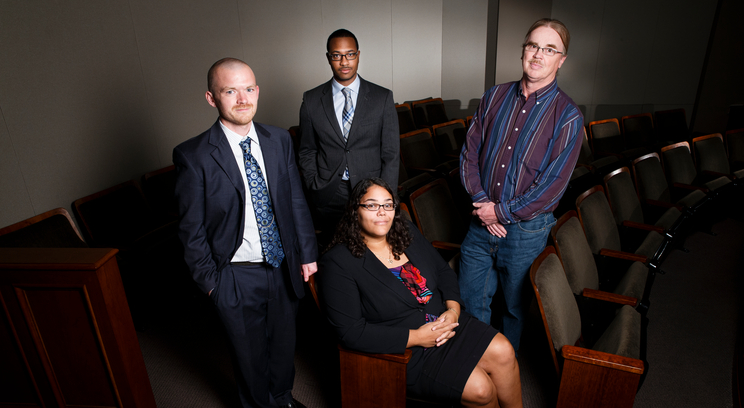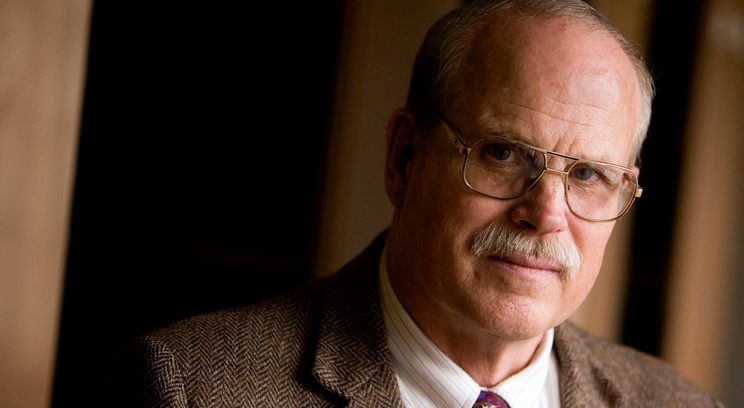Melissa Martinez relished Tuesday and Thursday mornings fall semester when her classroom was the courtroom and her coursework was helping real people facing difficult choices. Professionally speaking, this is where she felt most in her element.
A third-year law student, Martinez was participating as a student attorney in the School of Law’s Misdemeanor Clinic. She was one of 10 students enrolled in the course, now in its second full year.
The legal problems her clients encountered were not always as cut and dry as whether they were innocent or guilty.
“Most people entering into the criminal system are nervous, unaware and most times quite scared of what is going to happen to them,” said Martinez, who spent a year volunteering in a public defender’s office before enrolling in the Misdemeanor Clinic. “Too often people are in a position where things in their life can drastically change after their appearance in court, and they come here with little or no knowledge of how drastic that change can be.”
Getting that practical experience in the courtroom allowed Martinez and her fellow Misdemeanor Clinic student attorneys to better understand the tremendous responsibility of a public defender. Helping her clients navigate the court system and providing them with legal expertise were essential tasks, but Martinez said she most enjoyed helping clients feel supported.
“My clients felt at ease when they knew that someone was on their side and representing their interests,” she said.
Focusing on Criminal Law
The Misdemeanor Clinic – one of the 11 clinics housed in and overseen by the university’s Interprofessional Center for Counseling and Legal Services – is the fulfillment of a vision that started about seven years ago when Virgil Wiebe, professor and director of clinical education, began discussing the possibility of creating a clinic focusing specifically on criminal law.
“The idea was always there to add a clinic that had a specific focus on criminal law and would get students in the courtroom and working with clients at a higher volume,” said Wiebe, who has served as director of the university’s legal clinics for more than a decade. “Originally, we considered developing some externships on both the prosecutorial and defense sides, and then bringing them together in a clinic setting ... and that isn’t an impossibility for the future. But we are really pleased with how this Misdemeanor Clinic has developed as far as placement of the students with public defender’s offices that are very dedicated to making this a truly career-building experience for the students.”
The clinic is co-taught by Scott Swanson, the School of Law’s academic achievement director who has a professional background in criminal defense, and adjunct instructor Shawn Webb, an attorney in the 10th District Public Defender’s Office in Anoka County. The duo assigns each clinical student to one of several public defender’s offices in the Twin Cities area, and, on occasion, for students with geographical ties, in greater Minnesota.
Under the supervision of a designated attorney, the clinicians spend at least 180 hours during the semester representing clients with legal needs that range from not making bail in time to report to their job, to seeking advice on how to best address the criminal charges against them. The clinic also includes class time, when students and instructors meet to discuss practical aspects of navigating the courtroom and criminal procedure.
Swanson, who has worked as a public defender at both trial and appellate levels, gives credit for the initial success of the clinic to co-instructor Webb. Three years ago, as Wiebe and Swanson continued to seek opportunities to bring the clinic to fruition, Swanson reached out to Webb, a well-known public defender at the 10th District Courthouse in Anoka County who had already been teaching a class with a similar structure at another law school. Webb felt there was a continued demand for placement of law students at public defender’s offices across the metro and in greater Minnesota, where calendars are constantly filled with a high volume of clients.
Webb said not only is the St. Thomas Misdemeanor Clinic a mutually beneficial relationship for the students and the public defender’s offices that take them on, but the partnership often results in a renewing experience for the attorneys who agree to supervise the clinicians.
“There is such an infusion of energy and enthusiasm that our students bring to this experience,” Webb said. “That enthusiasm can be infectious. All of the onsite supervisors who work with our students enjoy the mentoring-teaching aspect of this program.”
From Hesitation to Dedication
Lindsay Schwab’s participation in the Misdemeanor Clinic embodies that assessment. Schwab, a 2L, took the course last summer and as a result secured a clerkship in the fall with the public defender’s office at the Hennepin County Courthouse. Prior to her participation in the clinic, Schwab said, she had no intention of becoming a public defense attorney. She applied for the program because she knew it would provide her with valuable experience in the courtroom and an opportunity to help those in need. She now considers her participation in the clinic and subsequent clerkship as a vocational “calling.”
“I feel compelled to help people navigate the confusing waters of the law that I am so fortunate to be becoming familiar with,” Schwab said. “The Misdemeanor Clinic was the best opportunity to begin getting experience in the field of criminal public defense that I could ever ask for ... and I haven’t looked back since.”
Swanson said Schwab’s story is a common testimony shared by misdemeanor clinicians when they gather each week for the classroom component of the course. The students spend about half their classroom time sharing their unique experiences – both the challenges and the successes – with their instructors and with one another.
“Each of these students experiences the challenges of the courtroom and representing a high volume of clients in difficult situations who often have little to no knowledge of the criminal justice system,” Swanson said. “So they share the frustrations, the crazy stories, the renewed perspectives – and they really gel around those common experiences. That is what this class, this clinic is all about.”
Read more from St. Thomas Lawyer.







